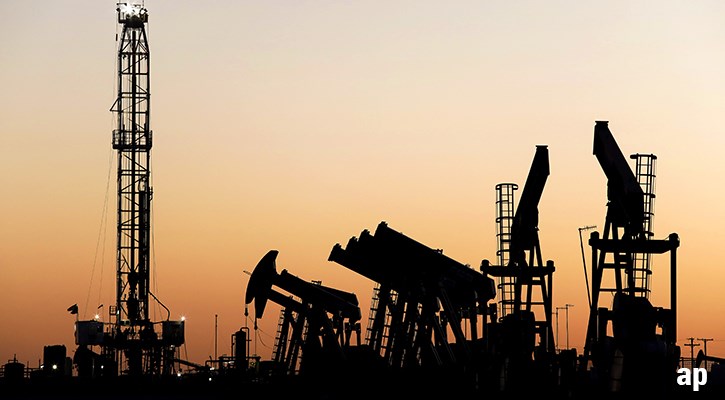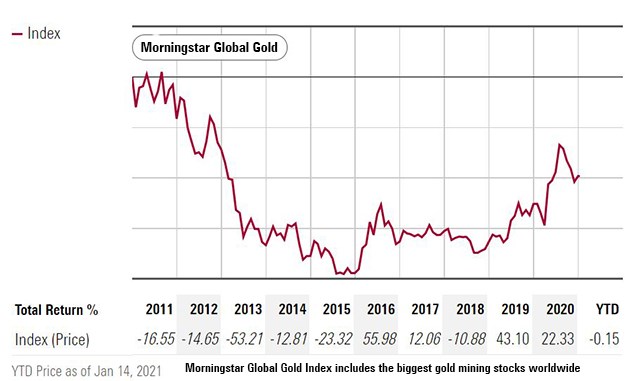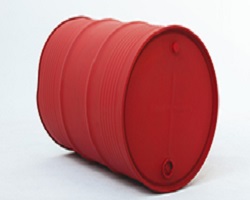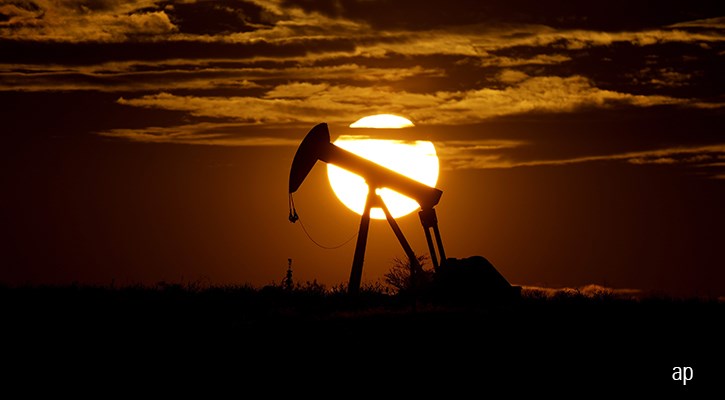
Oil and gold prices went in opposite directions in 2020: crude plummeted as energy demand crashed during the coronavirus crisis, while gold had a stellar year as investors flocked to the safe-haven asset, pushing prices above $2,000.
Positive vaccine developments mean the world economy should be in better shape this year, and hard commodities like iron ore and oil have rallied recently. It suggests investor are pricing in a strong recovery in global output in energy-intensive areas like travel and manufacturing. Forecasts are harder than ever to make after last year, but we’ve asked a number of experts to look at scenarios for commodities this year.
The Outlook for Oil
Down 20% in 2020, crude oil briefly went negative in the crisis last year. But since then oil has made a strong comeback as vaccine newsflow improved, and early in January crude broke through the $50 a barrel level. Morningstar has a medium-term forecast of $60 for the black stuff and analyst David Meats says there could be a supply shortage if the world economy recovers quickly: “Covid-19 vaccination has begun, laying the first foundations for recovery in 2021. But producers are not ready yet. Without further investment, the current oil glut could become a shortage in late 2021 or 2022.”
The recent oil price rise reflects some anxiety about Saudi Arabia’s decision to cut output more than expected in February and March. Tal Lomnitzer, manager of the 4-star rated Janus Henderson Horizon Natural Resources fund, says the move to reduce production has been a “real game changer in terms of sentiment”. But he is less bullish on a 10-year view as the world moves towards the clean energy transition.
Many UK investors will be exposed to the oil price through holdings in BP (BP.) and Shell (RDSB). Both stocks have recovered since the March slump and bounced in the end-of-year rally, but are still undervalued, according to Morningstar analysts – in BP’s case by around 33% and Shell by 37%.
UK stock markets are still heavily weighted towards energy and bank shares, so stronger oil prices should mean better returns for UK index investors, who had a pretty rough ride in 2020. Morningstar oil analyst Allen Good prefers French exploration company Total (TTA) over the UK supermajors though, not least because it maintained its dividend last year and is better positioned for the low-carbon future.

Can Gold Continue to Shine?
Morningstar data shows how popular gold was with investors last year. They flocked to it during the spring crisis as a safe-haven asset, driving the price above $2,000 - a 30% increase from the start of the year. Prices have since fallen back as economies look ahead to recovery and the memories of March’s stock market crash subside, but the gold price still finished 2020 some 25% higher than it started the year, comfortably ahead of even US indices.
Plenty of investors have started to worry about the effect of massive government stimulus on inflation. More US stimulus is expected under US President Joe Biden, which should also weigh on the US dollar. (A weaker dollar is good for commodities because they are sold in dollars, making them more attractive to overseas buyers). George Cheveley, portfolio manager at Ninety One says “gold and gold stocks could prove useful if inflation takes hold”.
Analysts at Wisdom Tree expect gold to breach $2,000 again even if the recovery continues on its current path. “The consensus view appears to be pricing in a straight-line recovery with very few bumps along the road,” says research director Nitesh Shah. But a resurgence in the virus in Europe means investors should brace for an uneven recovery with plenty of these bumps, giving gold a further push towards $2,300.
Mining Stocks and the Energy Transition
For gold as well as industrial metals like copper, iron ore and aluminium, much depends on the nature of the global economic recovery. China, which is a big buyer of these metals, has been at the forefront of this bounceback and the prices of iron ore have surged, helping the stocks of “diversified” miners like BHP (BHP), Rio Tinto (RIO) and Anglo American (AAL). These three stocks are now considered overvalued according to Morningstar metrics. But Janus Henderson’s Lomnitzer thinks there could be more gains to come if there’s a broad-based recovery. “Most metal prices are looking well supported, with scope for potential upside,” says.
Darius McDermott, managing director at FundCalibre also thinks there is more to come from the mining sector and that 2021 could be the year for commodities and infrastructure to shine: “While oil has potentially already had its bounce, metals will be key, especially as the push for electrification and renewable energy gathers pace.” So-called electric metals such as copper, lithium and nickel are in demand for electric vehicle batteries and solar panels, for example. (This does, however, create a dilemma for ESG investors who want to exclude resources companies from their portfolio).
Longer-term trends support the demand for commodities involved in the sustainable transition, especially as China last year committed to going carbon neutral by 2060. Still, the world economy has to navigate its way out of the current malaise first. "Economic uncertainty will persist during this unusual pandemic crisis that hasn’t been fully resolved yet," says Wisdom Tree's Shah.


























